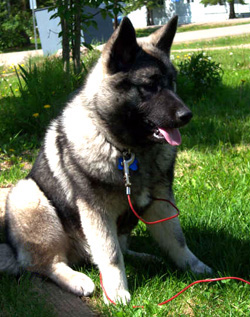
Norwegian Elkhound
Group: Hound Group
Origin: Norway
Height:
– Males: 20 1/2 inches and the withers.
– Females: 19 1/2 inches at the Withers.
Weight:
– Males: Approximately 55 lbs.
– Females: Approximately 48 lbs.

Layla – pictured here at 6 months old.
Photo courtesy of Jessica Perry
CLICK HERE to View Breeder Listings
Breed Profile
The Norwegian Elkhound is the national dog of Norway. In their native land, Elkhounds have been used to pull sleds, guard home and family, perform mountain rescue, hunt big game such as elk, moose and bear, and track for long hours in all types of weather and terrain. The Elkhound’s very acute senses of smell and hearing aid him in performing the functions he was originally bred for – to hunt and track large game.
The Elkhound is bold, energetic and was built for endurance and stamina. The breed is not aggressive by nature and known to be friendly even with strangers. However, he can be protective of his family and property and with his deep bark and intimidating appearance, he makes a good watchdog. He is also noted for being good with children and makes an excellent family companion.
The Elkhound is very energetic and requires daily exercise.
In appearance, the Elkhound is a typical northern dog of medium size, square in profile and balanced in proportions. He has the typical prick ears and a tightly curled tail which is carried over the back. The Elkhound’s coat is thick and hard but smooth-lying. He is grey in colour with black tips to the long hairs.
Health Issues
Like all breeds of dogs, the Elkhound breed does have certain health problems. The most prevalent in the breed include: Hip Dysplasia; Eye Problems; Renal Disease; and Cysts.
If you are considering the adoption of a Norwegian Elkhound puppy, or any breed, it is very important to be selective in choosing a responsible and reputable breeder. Ensure that the prospective puppy’s parents have all health clearances. Breeding of any dog should not be done until after they have been proven to be free of evidence of significant hereditary diseases. (For more information on selecting a breeder, see the articles on the main General Information page.)
Additional Health Resources:
- The NEAA – Health Information
- Health and Nutrition — Growing section of the Canada’s Guide to Dogs website which includes information on several health and nutrition related issues.
- Canine Health Information Center (CHIC) — Providing a source of health information for owners, breeders, and scientists that will assist in breeding healthy dogs. CHIC is a centralized canine health database jointly sponsored by the AKC/Canine Health Foundation (AKC/CHF) and the Orthopedic Foundation for Animals (OFA).
- AKC Canine Health Foundation — Working towards developing scientific advances in canine health.
- Canine Eye Registration Foundation (CERF)
- Orthopedic Foundation for Animals (OFA)
- Ontario Veterinary College (OVC)
- University of Pennsylvania Hip Improvement Program (PennHip)
- HealthGene — HealthGene Corporation is the leading provider of veterinary DNA diagnostic services in Canada.
- Labgenvet — Laboratory of Veterinary Genetics is a Canadian diagnostic laboratory that offers a comprehensive service of DNA tests for veterinary genetic diseases.
Grooming Information
- Grooming — This section of the Canada’s Guide to Dogs website includes tips, articles and information covering all aspects of dog grooming along with a listing of Groomers from across Canada.
Training Resources
- Training Your Norwegian Elkhound
- Training — For training information, see this growing section of the Canada’s Guide to Dogs website for tips, articles, as well as listings of training centres across Canada.
Additional Information
- Clubs, Sports & Activities — For information on the many sports and activities you can get involved in with your dog.
- Working Dogs — The Working Dogs section of the Canada’s Guide to Dogs website provides information and listings of organizations that are involved in various dog jobs, such as Guide Dogs, Therapy Dogs, Police Dogs, Protection Dogs, and much more.
Breed Listing
*NOTE 1: CHIC – The Canine Health Information Center “is a database of consolidated health screening results from multiple sources. Co-sponsored by the Orthopedic Foundation for Animals (OFA) and the American Kennel Club (AKC) Canine Health Foundation, CHIC works with parent clubs to identify health screening protocols appropriate for individual breeds. Dogs tested in accordance with the parent club established requirements, that have their results registered and made available in the public domain are issued CHIC numbers.” To learn more, visit: www.caninehealthinfo.org
*NOTE 2: The Fédération Cynologique International (FCI) is the World Canine Organization, which includes 91 members and contract partners (one member per country) that each issue their own pedigrees and train their own judges. The FCI recognizes 344 breeds, with each being the “property” of a specific country. The “owner” countries write the standards of these breeds in co-operation with the Standards and Scientific Commissions of the FCI, and the translation and updating are carried out by the FCI. The FCI is not a breed registry nor does it issue pedigrees.
Quick Links
Get In Touch
- Email: canadasguidetodogs@gmail.com
- Email: info@canadasguidetodogs.com
- Visit us on Facebook: www.facebook.com/CanadasGuideToDogs
— CanadasGuideToDogs.com is an Amazon Associate as well as a participant in various affiliate programs, as such fees are earned from qualifying purchases.
